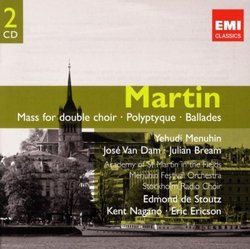| All Artists: Yehudi Menuhin, Kent Nagano, Academy of St-Martin-in-the-Fields, Menuhin Festival Orchestra, José van Dam, Julian Bream, Stockholm Radio Choir, Edmond de Stoutz, Eric Ericso Title: Martin: Mass for Double Choir, Polyptique, Ballades Members Wishing: 0 Total Copies: 0 Label: EMI Classics Original Release Date: 1/1/2009 Re-Release Date: 3/24/2009 Genres: Folk, Pop, Classical Styles: Vocal Pop, Opera & Classical Vocal, Chamber Music, Forms & Genres, Ballads, Concertos, Instruments, Reeds & Winds, Symphonies Number of Discs: 2 SwapaCD Credits: 2 UPCs: 400000014432, 5099926434421 |
Search - Yehudi Menuhin, Kent Nagano, Academy of St-Martin-in-the-Fields :: Martin: Mass for Double Choir, Polyptique, Ballades
 | Yehudi Menuhin, Kent Nagano, Academy of St-Martin-in-the-Fields Martin: Mass for Double Choir, Polyptique, Ballades Genres: Folk, Pop, Classical
|
Larger Image |
CD Details |
CD ReviewsAn Excellent Collection of Essential Martin Works Nicholas A. Deutsch | New York, NY USA | 03/24/2009 (5 out of 5 stars) "This excellent compilation of music by Swiss composer Frank Martin (1890-1974), drawn from the EMI / Virgin Classics back catalogue, comprises four orchestral works, two for unaccompanied chorus, a solo song cycle with orchestra, and an instrumental piece. All eight rank among his greatest works, six of them among the most popular. The performances, two from the 1990s and the rest from the 1970s, range from very good to superb. Though it's a shame there are no vocal works in French (Martin's first language), the collection makes a fine introduction to a great composer.
No texts for the vocal works, but the Latin Mass and the excerpts from Shakespeare's Tempest (Songs of Ariel) shouldn't be hard to find. For the Sechs Monologe aus Jedermann, there's always the first-rate Warner Apex budget CD of Martin works conducted by Armin Jordan, which prints Hugo von Hofmannsthal's original German with French and English translations. Some basic information about the works (including corrections and clarifications to the booklet note): The Mass for Unaccompanied Double Choir (1922-24, the Agnus Dei added in 1926), received its first performance in 1963. The Four Short Pieces for Guitar was written in 1933. The composer used the term "ballade" for a series of six short one-movement works for solo instrument accompanied by piano or orchestra: the original version of the Ballade for Flute (1939) was for piano, the one for string orchestra and piano comes from 1941. Similarly, the Six Monologues from Jedermann (Everyman) was composed for baritone and piano (1943-44) and later scored for full orchestra (1949). The Petite Symphonie Concertante (1944-45), Martin's most famous orchestral work, calls for harp, harpsichord, piano and double string orchestra. Songs of Ariel, also known as Five Ariel Songs (Ariel: Cinq pièces tirées de la Tempête de Shakespeare), was commissioned by the Netherlands Chamber Choir and dates from 1950. It's Martin's sole English-language work. He later adapted the songs for his opera Der Sturm (1952-55), fitting Schlegel's German translation to the existing music with only minor adjustments. The Ballade for Viola, wind orchestra, harp, harpsichord, timpani and percussion (1972) and Polyptyque, for solo violin and two small string orchestras (1973) were Martin's last orchestral works. The latter piece is dedicated to violinist Yehudi Menuhin, the Zurich Chamber Orchestra and conductor Edmond de Stoutz; they gave the premiere, and made this recording in 1974 (with the Menuhin Festival Orchestra) under the composer's supervision shortly before his death. The following year, his wife Maria, a professionally trained flutist, oversaw Menuhin's recording of the Ballade, conducted by Michael Dobson. Finally, the six "pictures" (images) comprising Polyptyque can be translated as: 1. The Palm Branches [i.e. Christ's entry into Jerusalem] / 2. The Upper Room [i.e. the Last Supper] / 3. Judas / 4. Gethsemane / 5. The Judgment / 6. The Glorification. " |

 Track Listings (12) - Disc #1
Track Listings (12) - Disc #1